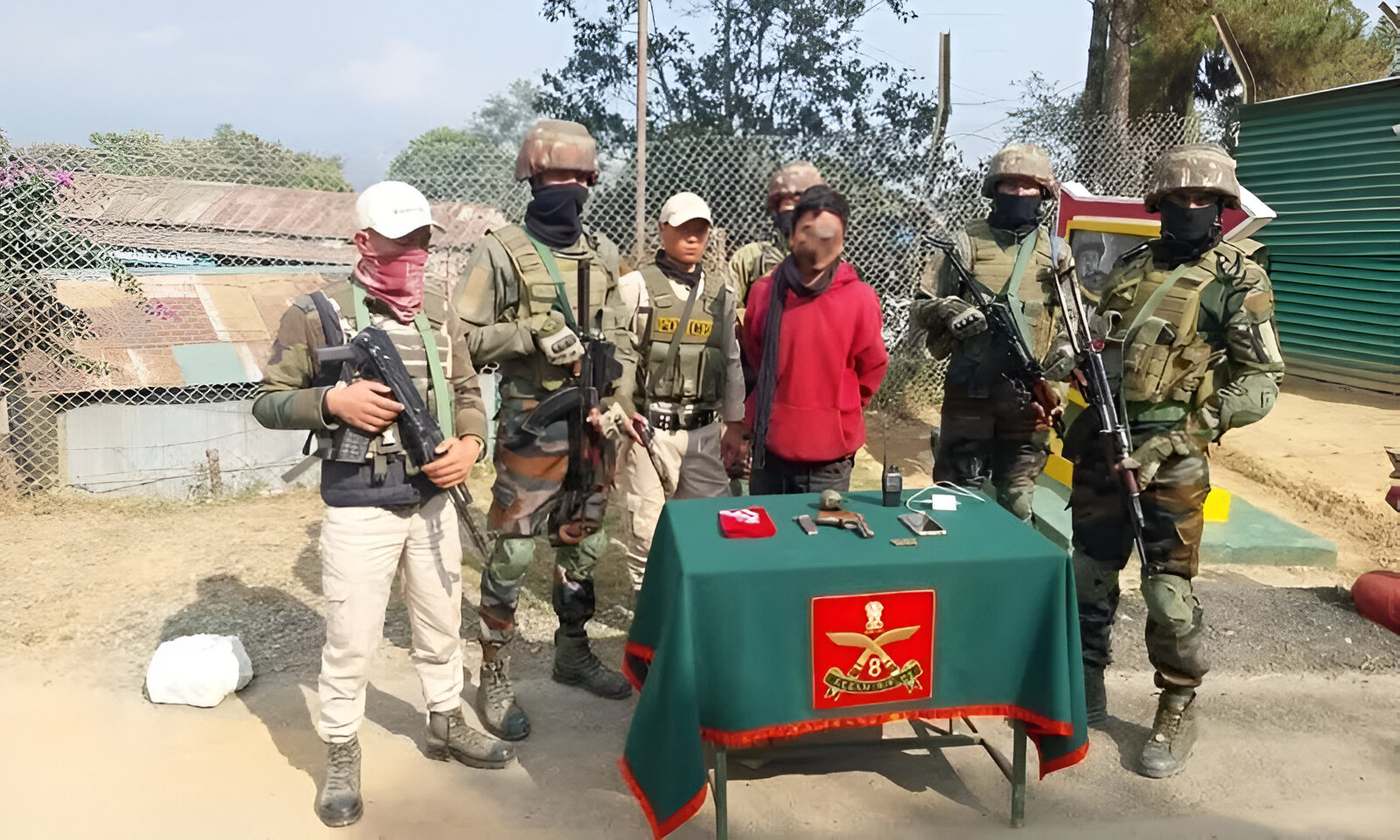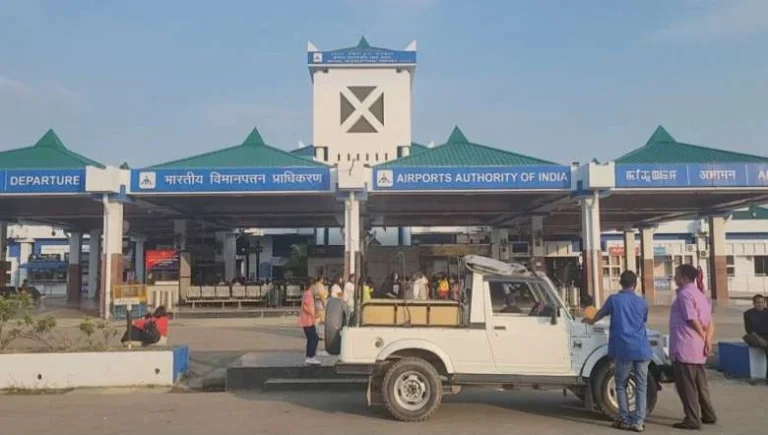PLA Arrested with Pistol and Grenade at Manipur-Myanmar Border: A Wake-Up Call for Enhanced Border Security
Short Summary
In a dramatic and significant security operation near the Manipur-Myanmar border, authorities apprehended an individual allegedly linked to the PLA who was found in possession of a pistol and a grenade. This bold arrest not only underscores the persistent security challenges along the border but also highlights the unwavering commitment of security forces in safeguarding regional peace and national integrity.
In-Depth Article: A Deep Dive into the Arrest and Its Implications for Northeast India
Introduction
Have you ever wondered what it takes to secure a border where tensions run high and the stakes are enormous? Recently, a startling incident near the Manipur-Myanmar border brought these challenges into sharp focus. In a carefully orchestrated operation, security forces arrested an individual allegedly connected to the PLA who was caught with a pistol and a grenade. This incident isn’t just a headline—it’s a vivid reminder of the ever-present challenges on our borders and the relentless efforts of our security personnel. So, let’s unpack this event step by step and understand why it’s a turning point for border security in Northeast India.
The Incident: What Really Happened?
Picture this: a quiet day along the rugged terrains of the Manipur-Myanmar border suddenly interrupted by a flash of action. Security forces, always on high alert in this sensitive area, intercepted an individual carrying dangerous weapons—a pistol and a grenade. Reports suggest that this person is linked to the PLA, an association that raises serious concerns given the complex security dynamics in the region. The swift arrest is a testament to the sharp vigilance and preparedness of local law enforcement agencies.
But what does this mean for the area? Essentially, this operation is a strong signal that illicit activities and potential threats will not go unnoticed. It’s like catching a speeding car on a busy highway—the authorities are always ready, ensuring that no one compromises the safety of our communities.
Understanding the Border Dynamics in Manipur
Manipur is a land of vibrant cultures and breathtaking landscapes, but it also sits on a sensitive border with Myanmar. This region has, over the years, seen its fair share of security challenges, including smuggling, insurgency, and cross-border infiltrations. The arrest of this PLA-linked individual is a reflection of the complex security ecosystem at play here.
- Geographical Challenges: The Manipur-Myanmar border is characterized by dense forests, rugged terrain, and winding rivers. These natural features, while stunning, provide numerous hideouts and secret routes for illicit activities. Security forces must navigate these difficult terrains every day, much like explorers charting unknown territories.
- Historical Tensions: The border has witnessed longstanding tensions due to historical grievances, ethnic conflicts, and strategic rivalries. Such issues often create a fertile ground for insurgent activities and smuggling networks.
- Cross-Border Influence: Myanmar’s proximity adds an extra layer of complexity. The porous nature of the border means that any lapse in vigilance could have far-reaching consequences, impacting not only Manipur but also the broader security landscape of Northeast India.
By understanding these dynamics, it becomes clear why this recent arrest is such a critical victory for security forces. It’s a small but significant step in countering the multifaceted challenges that have long plagued the region.
The Role of Security Forces: Vigilance at Its Best
Our security personnel are the unsung heroes who work tirelessly to keep our borders secure. In this case, their alertness and strategic planning played a pivotal role in apprehending the suspect.
- Coordinated Operations: The arrest was not a haphazard event but a well-coordinated operation. Teams on the ground, using the latest intelligence and technology, tracked the movements of the suspect. Imagine a finely tuned orchestra where every instrument plays its part perfectly—that’s what this operation looked like.
- Technological Edge: Modern surveillance tools and communication systems significantly enhance the ability of security forces to monitor vast and challenging terrains. Drones, thermal imaging, and real-time data sharing are just a few examples of how technology is revolutionizing border security.
- Community Cooperation: Local communities, familiar with the land and its hidden trails, often play a supportive role in such operations. Their cooperation can be likened to having a local guide when trekking through uncharted territory, providing critical insights that only a native could offer.
- Continuous Training: The commitment to regular training and readiness drills ensures that security forces remain one step ahead. Their ability to swiftly react to potential threats demonstrates the high level of preparedness that is essential in such volatile regions.
The success of this operation stands as proof that when determination meets preparation, even the most challenging security threats can be neutralized.
The Alleged PLA Connection: What Does It Mean?
One of the most alarming aspects of this incident is the alleged connection of the arrested individual with the PLA. The PLA, or People’s Liberation Army, is often in the news for its extensive military capabilities. However, any association with the PLA in the context of border security raises serious questions and concerns.
- Security Implications: The involvement of a person linked to a formidable military entity like the PLA in illicit activities near the border is alarming. It suggests that there might be attempts to use covert means to influence or destabilize the region.
- Political Ramifications: This arrest could potentially have broader diplomatic and political implications. When border incidents involve entities linked to a foreign military, it often triggers discussions about sovereignty, national security, and regional stability.
- Increased Scrutiny: Following this arrest, authorities are likely to intensify their surveillance and investigative efforts. This heightened scrutiny is a clear message to any potential wrongdoers that the border will not be a haven for illegal activities.
While the full extent of the PLA connection is yet to be determined, the incident undoubtedly adds a layer of urgency to border security measures.
Reactions from Local and National Authorities
No major security operation goes unnoticed, and this one is no exception. Both local and national authorities have weighed in on the matter, emphasizing the need for continued vigilance and coordinated efforts.
- Local Leadership: Leaders in Manipur have expressed relief and pride over the operation. They highlight how the arrest reinforces the commitment to safeguarding their communities and ensuring a safe environment for everyday life.
- National Security Agencies: On a broader scale, national security agencies view this incident as a wake-up call. It underscores the importance of robust intelligence sharing, strategic planning, and the implementation of advanced technologies to monitor and secure sensitive border areas.
- Public Sentiment: The local population, who have long lived under the shadow of border-related threats, are likely to welcome this development with a sense of security and optimism. Knowing that security forces are on high alert can significantly boost public morale.
- Political Discourse: In the political arena, the incident may prompt debates on the allocation of resources, the need for stronger border policies, and the importance of cross-border diplomatic engagements.
These reactions collectively point towards a unified stance against illegal activities at the border and a shared commitment to national security.
Implications for Cross-Border Relations
When incidents like these occur, they don’t just affect local security—they also have the potential to ripple outwards, influencing international relations, particularly with neighboring countries like Myanmar.
- Diplomatic Sensitivities: The arrest of an individual allegedly linked to the PLA near the border could strain diplomatic ties. Governments will need to tread carefully, balancing national security concerns with the need to maintain constructive dialogue with neighboring nations.
- Enhanced Cooperation: On a positive note, such incidents can also pave the way for enhanced cooperation between border security agencies of both countries. Working together to address common challenges can lead to stronger, more resilient border management systems.
- Regional Stability: Stability in border regions is critical for overall regional prosperity. As nations collaborate on security matters, they contribute to a more stable and peaceful environment that benefits not just the immediate area but the broader international community.
- Economic Considerations: Secure borders are also essential for the smooth flow of trade and commerce. Any disruption due to security lapses can have economic ramifications. Therefore, maintaining robust border security is in the best interest of both domestic and international stakeholders.
In essence, while the arrest highlights significant security challenges, it also opens doors for dialogue and collaborative efforts to ensure long-term peace and stability in the region.
The Bigger Picture: Border Security Challenges in Northeast India
Northeast India is a region of immense natural beauty and cultural richness, but it also faces unique security challenges due to its strategic location and complex history. This incident is a microcosm of the broader issues that demand constant attention.
- Smuggling and Trafficking: The porous borders in this region have long been a conduit for smuggling and trafficking—be it arms, drugs, or even human trafficking. Each incident like this one reinforces the need for a multi-pronged approach to curb these activities.
- Insurgent Movements: Over the years, insurgent groups have taken advantage of the region’s rugged terrain and isolated communities to launch their operations. The arrest sends a clear message that these groups will be met with a firm response.
- Resource Constraints: The challenges of patrolling vast and difficult terrains mean that security forces often operate with limited resources. This makes each successful operation all the more commendable and crucial.
- Modernization of Security Measures: In response to evolving threats, there has been a concerted effort to modernize security infrastructure. Investing in advanced technology, training, and inter-agency collaboration is critical to staying ahead of potential threats.
- Community Empowerment: Empowering local communities to actively participate in security efforts is also key. When people feel involved and informed, they become the first line of defense against any illicit activity.
Each of these factors contributes to a complex security landscape, one that requires constant vigilance, innovation, and, most importantly, a united front.
Future Security Measures and the Road Ahead
Given the gravity of the incident, what can we expect in terms of future security measures along the Manipur-Myanmar border? The answer lies in a blend of technology, strategy, and community involvement.
- Advanced Surveillance Systems: Authorities are likely to deploy more drones, thermal cameras, and satellite-based monitoring systems. These technologies help cover the vast and rugged terrain more efficiently and act as an early warning system against potential threats.
- Enhanced Training Programs: Regular training for security forces, focusing on both technical skills and cultural sensitivity, will be a priority. This ensures that personnel are not only well-prepared but also able to engage with local communities respectfully.
- Strengthening Local Networks: By building stronger relationships with local inhabitants, security agencies can tap into community intelligence. This grassroots network often proves invaluable in identifying suspicious activities before they escalate.
- Inter-Agency Collaboration: Future measures will likely emphasize better coordination between local police, border security forces, and national intelligence agencies. This integrated approach ensures that every piece of information is shared promptly and acted upon decisively.
- Policy and Diplomatic Engagement: On the policy front, there might be renewed efforts to engage with neighboring countries to tackle cross-border threats collaboratively. Diplomatic channels can help resolve misunderstandings and foster mutual cooperation, ultimately contributing to regional stability.
This forward-thinking approach is crucial if we are to safeguard our borders against the myriad challenges that lie ahead.
Expert Opinions: What Do the Analysts Say?
Experts in border security and international relations have weighed in on this incident, offering valuable insights into its implications.
- Security Analysts: Many security experts view the arrest as a significant achievement that demonstrates the operational readiness of our border forces. They argue that such proactive measures are essential in deterring future attempts by criminal or insurgent elements to exploit the porous borders.
- Political Commentators: Political commentators are likely to stress that incidents like these have both immediate and long-term consequences. They highlight that while the operation has neutralized an immediate threat, it also serves as a catalyst for further reforms in border management and intelligence sharing.
- Regional Specialists: Specialists focusing on Northeast India point out that this incident reinforces the need for a nuanced approach to border security—one that respects the cultural and geographical realities of the region while meeting modern security demands.
- Diplomatic Observers: Observers in international relations warn that any hint of external involvement in illicit activities near national borders can lead to diplomatic friction. They advocate for measured responses that prioritize dialogue and cooperation alongside robust security measures.
The consensus among experts is clear: the arrest is a positive development, but it also underscores the importance of remaining vigilant and adaptive in the face of evolving threats.
Impact on Local Communities and Their Future
At the end of the day, security operations are about protecting people and their way of life. For the local communities along the Manipur-Myanmar border, this incident brings a renewed sense of safety and hope.
- Restoring Public Confidence: When communities see that security forces are effective and proactive, it restores their confidence in the system. It’s like knowing that a trusted neighbor is always watching out for you.
- Economic and Social Stability: A secure border means that local businesses and daily life can proceed without the constant worry of smuggling or insurgency. This stability is crucial for long-term economic development and social harmony.
- Empowering the Youth: The youth in these regions, who have often been drawn into illegal activities due to lack of opportunities, can now see a brighter future. With improved security and a focus on sustainable development, they have more reasons to invest in legitimate careers and community growth.
- Encouraging Tourism: A secure and stable border also opens up avenues for tourism, showcasing the region’s natural beauty and cultural richness to a broader audience. Tourism, in turn, can be a significant economic booster for local communities.
- Building a Legacy of Resilience: This incident will likely be remembered as a turning point—a moment when local communities and security forces united to protect their homeland. Such legacies inspire future generations to prioritize safety, community, and sustainable progress.
Lessons Learned and the Path Forward
Every major event brings with it lessons that pave the way for future improvements. The arrest near the Manipur-Myanmar border is no exception, offering several key takeaways.
- The Importance of Preparedness: The swift action taken by security forces reinforces the value of being prepared at all times. Whether it’s through advanced training or the adoption of new technologies, readiness is non-negotiable.
- Community Involvement: Empowering local communities to participate in security measures can significantly enhance overall vigilance. When people feel involved, they are more likely to report suspicious activities and support law enforcement efforts.
- Balancing Force with Diplomacy: While strong security measures are essential, maintaining open channels for diplomatic engagement ensures that incidents do not escalate into international crises.
- Investing in Technology: Modern security challenges require modern solutions. Continued investment in surveillance, intelligence, and communication technologies is critical for staying ahead of potential threats.
- A Collaborative Approach: The success of this operation highlights the power of collaboration. Whether it’s inter-agency cooperation or partnerships with local communities, working together creates a robust defense against security challenges.
These lessons are not just theoretical—they are the building blocks for a safer and more secure future for all those living along our borders.
Conclusion: A Moment of Vigilance and Hope
In wrapping up, the arrest of an individual allegedly linked to the PLA with a pistol and a grenade at the Manipur-Myanmar border is more than just an isolated incident—it’s a symbol of vigilance, resilience, and the unyielding commitment to national security. This operation reminds us that even in the face of complex challenges, dedicated security forces and engaged communities can make a profound difference.
The incident serves as a wake-up call, urging us to continuously adapt and enhance our border security measures. It’s about safeguarding our homes, our livelihoods, and our future. With every operation, we come one step closer to a secure, stable, and prosperous environment in Northeast India. So, here’s to the brave men and women who stand guard at our borders and to the communities that unite in the face of adversity—a testament to the fact that when we work together, nothing is impossible.
FAQs
- What exactly happened at the Manipur-Myanmar border?
Security forces intercepted and arrested an individual allegedly linked to the PLA, who was found carrying a pistol and a grenade. The swift operation highlights the challenges and vigilance required to secure this sensitive border area. - Why is the arrest of a PLA-linked individual significant?
The alleged connection with the PLA raises concerns about potential external influences and security threats. The arrest underscores the need for robust border security measures to prevent any attempts to destabilize the region. - How do local communities benefit from such security operations?
A successful operation boosts public confidence, ensures economic and social stability, and encourages community participation in maintaining a secure environment. It also fosters long-term development and resilience in the region. - What steps are being taken to improve border security in Northeast India?
Authorities are investing in advanced surveillance technology, enhancing inter-agency cooperation, conducting regular training, and promoting community involvement to ensure that the border remains secure against various threats. - How might this incident affect cross-border relations with Myanmar?
While the incident may raise diplomatic sensitivities, it also creates opportunities for increased cooperation between border security agencies. By addressing security challenges together, both countries can work toward a more stable and secure region.




